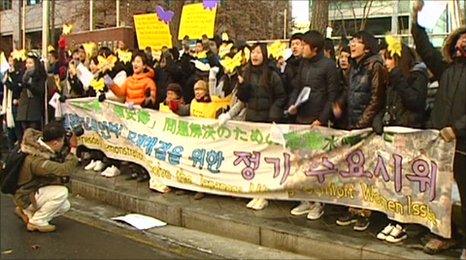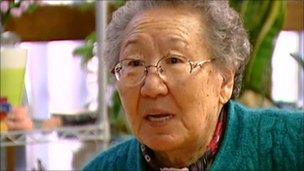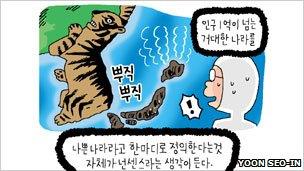Dark past haunts South Korea and Japan
- Published

Some Koreans still harbour deep resentment towards Japan
Two allies facing a common threat on their doorstep should pool their resources. It seems a simple enough logic.
The plan is for South Korea and Japan to begin limited military co-operation - providing each other's armed forces with fuel, food and equipment on certain operations.
And also sharing military intelligence on North Korea which, only last month, threatened a "sacred" nuclear war.
But while both Seoul and Tokyo are each allies of Washington, they are not yet allies of each other. At least not military ones.
For 35 years up until the end of World War II, Japan was the harsh colonial ruler of the entire Korean peninsula.
The Korean language was suppressed - many people were even forced to take Japanese names.
Men were conscripted to fight in the Japanese army or forced to labour in their mines and factories. And thousands of women - the exact number is still disputed - were forced to become prostitutes for Japanese troops.
Some Koreans still harbour deep resentment, so talk of a cosier relationship with Japan's modern day army is highly sensitive.
'Comfort women'
The plan was denounced loudly at a protest outside the Japanese embassy in Seoul.

Gil Won-ok dismisses any talks about treaties with Japan as "nonsense"
One of those shouting and punching the air was Gil Won-ok - now in her 80s - who as a 13-year-old girl was one of those forced to have sex with Japanese soldiers.
She and other surviving "comfort women" (as they were euphemistically called) have been demanding a more explicit apology and compensation.
"The Japanese are not the kind to be helping us," she says referring to the proposed military pact.
"They can't even repent for past wrongdoings. And now the talk about signing treaties? What nonsense."
Japan's defeat in WWII led to its expulsion from Korea - the end of the bitter colonial period.
And there followed the Cold War confrontation of the Korean War (1950-1953) - ending with a communist North and broadly capitalist South.
But there was only a ceasefire - not a proper peace treaty. So North and South are still at war, technically. Ever since, hostilities have flared on a regular basis.
Last March a South Korean warship was sunk. North Korea was widely blamed but has denied responsibility.
In November the North shelled an island belonging to South Korea but that sits in waters which the North claims as its own.
For weeks there was a worrying spike in tensions when even the most cool-headed analysts feared a broader conflict might once again break out.
'Double-minded'
Which takes us back to the logic of Japan and South Korea becoming closer, militarily.
Over the decades, the North has threatened Tokyo too. Leaders in Pyongyang might say "understandably" given Japan's brutal treatment of the peninsula until 1945.
But for South Korean policymakers, it is not just an assessment of the current geopolitics. There is inevitably an eye, too, on the public reaction.
Yoon Seo-in is a popular South Korean blogger and cartoonist, who has written travel guides to Japan - you might describe him as an enthusiast for the country.

South Korea is shown as a tiger, with the islands of Japan less flatteringly emerging from the tiger's rear
I asked him to publish a cartoon exploring how South Koreans see the Japanese and also this plan for closer military ties.
He based it on a map of the two countries with the Korean peninsula flatteringly drawn as a tiger, and with the islands of Japan less flatteringly emerging from the tiger's rear.
A cartoon man is shown suggesting this negative attitude is ridiculous. The comic prompted a big response.
"I've received perhaps 10 times more replies than normal. It's been heated online," he says.
"Perhaps 40% share my views. But 60% would say 'you Japanese sympathiser - go and live there.' "
This self-selecting sample is unscientific, but does reflect a strong undercurrent in the thinking of a significant number of South Koreans.
On balance, Mr Yoon supports the proposed military pact.
"It isn't that I don't understand people's worries," he says. "But the immediate threat is North Korea and China's expansion. Japan, South Korea and America should continue with close co-operation."
To use the phrase of one veteran Japanese correspondent who has lived in Seoul for 30 years, South Koreans are "double-minded".
He told me they are suspicious of them whilst accepting that they need to learn from the Japanese.
This is a country where up until the late 1990s, Japanese books, films and music were officially banned. Now, there are racks of such imports in downtown Seoul's shops.
Cultural exchange is blossoming. Indeed Japan is now South Korea's third largest trading partner. And, of course, the countries co-hosted the 2002 World Cup.
But there are lingering disputes too: territorial ones over islands and historical ones such as what Japanese children are taught about the colonial period in school.
So: closer military ties? That's what the US has been urging recently.
For many South Koreans, bruised by the experience of 1910-1945, that's still a step too far.
Although with an increasingly muscular China - and unpredictable North Korea perhaps further on in its nuclear programme than previously thought - they may not have much choice but to accept the limited embrace of a country that in living memory was seen as an enemy.
- Published10 August 2010